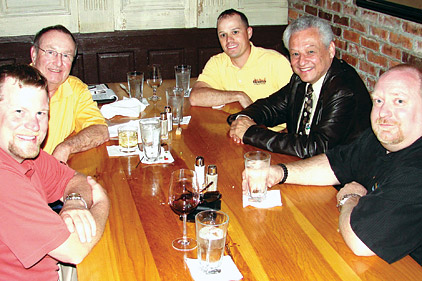Recently, a group of contractors and distributors sat down for an informal chat about how they weathered the recession storm and what advice they have for others facing tough choices due to challenging economic conditions.
“Throughout the last few years, we never changed our philosophy,” said Henry Temchin, past president of the Kansas City ACCA Chapter and salesman for local contractor A.B. May. “But we have had to work harder in the last two years. It sometimes takes two calls to close a sale instead of one.
“The recession made us give more attention to what we were doing, increasing selling skills, and spending more time with customers.”
Casey Pinnock of AFC Heating and Cooling used that same philosophy. “We have learned how to sell better — and to sell up,” he said. “Other contractors didn’t know how to sell better — but we did.”
Some contractors chose to enter the residential replacement market, much to the chagrin of local contractor James Gallet of Envirotech Heating, Cooling, Energy Solutions. “When commercial work slowed down, contractors started into residential work and there were a lot of low bidders,” he said. “We didn’t want to raise prices, so we saw profits decline.”
William Summers of Gustave Larson noted that new players in the local Kansas City HVAC market have little barrier to entry, which is not good news for established businesses. “It is more cutthroat here than in many other major population centers,” he said.
But Pinnock said that he saw one positive link to the recession. “It got rid of a lot of the riffraff,” he said.
The Right Market and the Right Products
Some of the Kansas City contractors found themselves on shaky ground when the economy started to nosedive because of the market they were in — new construction. The warning signs were there for a slowdown and luckily for some, the signs were heeded. One distributor, Matt Curnow of O’Connor Co. Inc., suggested that his customers take a long look at their business models.
“For years I have been suggesting to my customers that they drop new construction and concentrate on the replacement market,” he said. “I have been transitioning people into the replacement market.”
Pinnock said, “We were doing a lot of new construction at the time. Business was good prior to 2009, but we never realized the true importance of service contracts until the slowdown.”
Service contracts were the buzzword among other people at the roundtable meeting. “We had service contracts, which helped us get through,” said Gallet. “We knew that people were hesitant to spend during the recession, opting for more repair work than replacement.”
“Service contracts have always been a key,” said Temchin. “Plus, we worked through a local realtor who sold home warranty plans.”
Being in the right market with the right product did not necessarily guarantee monetary success. It has been a struggle for some contractors to keep their profits at comfortable levels. “There was pressure to cut prices but we preferred to work more ‘give-and-takes’ and we would include higher margins on high efficiency equipment, so there was wiggle room in pricing,” said Temchin.
Summers said, “We have seen a decrease in gross margins, which is consistent with more supply and less demand. Prices have gone up, which have kept sales volumes up.”
Temchin noted that the tax credits for high efficiency equipment helped some contractors get through the tough times, but they weren’t a guarantee of future business. “Tax credits got us in the door, but they didn’t necessarily make the sale,” he said. “Salespeople cannot be order takers. People buy from people they like.”
“The tax credits drove sales,” said Curnow. “Now in 2011 we have to get back to selling features and benefits.”
Sage Advice From “Been There/Done That”
Speaking of 2011, what advice would Kansas City contractors and distributors give business owners facing economic challenges?
Pinnock said, “A long time ago an advisor of mine told me that when your business volume is consistently down that you need to raise your prices not lower them. He also noted that your most loyal customers will pay more because they know and trust you.”
“Keep your employees or co-workers motivated,” said Gallet. “This is very tough to do when things get slow and you, the owner, are not motivated. I would also suggest that you train your field staff so they make the most out of every call they are on, treat every customer like it is your only customer or job of the day, and don’t leave the house until they are 100 percent satisfied.”
Gallet added, “Also, during the recent downturn, our marketing focus changed slightly. The best thing that I did to create more business was to join a couple of networking groups. Shaking hands and talking to strangers has been our best source of new business during the downturn.”
Temchin had several suggestions. “Get back to the fundamental aspects of sales: listen to the consumers and provide what they seek,” he said. “Tell the customer what you do, e.g., drug screens, background checks, certified techs, 24/7 service, etc. Never assume the customer understands your business and make sure you differentiate yourself from the competition.”
Curnow agreed that differentiation is huge. “In other words, be different from everyone else in installation, values, service, and product representation,” he said.
Summers said that business planning is key, especially contingency plans for supplementing sales with peripheral and non-seasonal products. “We have grown significantly as an industry in non-traditional applications like outdoor heating (commercial and residential), explosive growth in geothermal and ductless, and additional opportunities in IAQ accessories.”
In the end, it may just be as simple as taking care of each customer — one at a time. “I am a product of the ’60s — I still believe you take care of the customer who is responsible for your success,” said Temchin. “Do what’s right and the money will take care of itself.”
Publication date: 09/05/2011


Report Abusive Comment